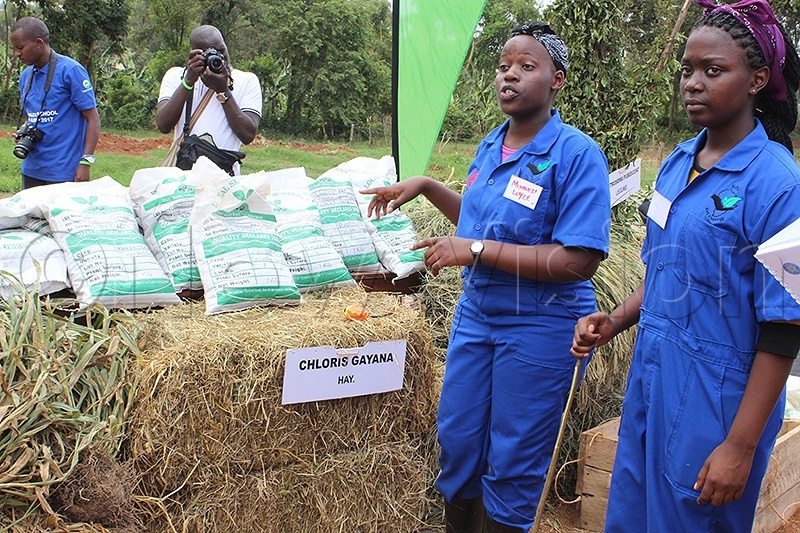Skilling youth in agriculture key in Uganda's COVID-19 recovery
Jul 16, 2020
According to Ronald Ddungu an education advisor at VVOB Uganda, for an agrarian country like Uganda where over 70% of the population is employed in agriculture, it is important to support young people acquire skills in agriculture.

COVID-19 YOUTH AGRICULTURE
Skilling youth in agriculture and enabling them to participate in decision making will be key for Uganda's COVID-19 recovery.
According to Ronald Ddungu an education advisor at VVOB Uganda, for an agrarian country like Uganda where over 70% of the population is employed in agriculture, it is important to support young people acquire skills in agriculture.
"Agricultural education and training need to continue even during these COVID-19 times and should be strengthened to become future proof," Ddungu says.
Ddungu said this during his presentation as part of the online panel discussion organized by the Permanent Missions of Portugal and Sri Lanka to the United Nations, together with UNESCO, ILO and the Office of the Secretary-General's Envoy on Youth.

The online discussion was part of the celebrations to mark the World Youth Skills Day 2020 on Wednesday. The day was celebrated under the theme, "Skills for a Resilient Youth"
According to Ddungu, the agriculture sector will continue to absorb most Ugandan youth for the next decades.
Engaging youth in agriculture can provide a solution for many future post-COVID-19 challenges related to food security, unemployment, and climate change.
Ddungu reveals that while schools are closed, teachers and instructors can continue using radio, Televisions or online platforms to engage learners in home-based projects.
"Even with limited resources, valuable technical skills and entrepreneurial skills can be learned at home; like growing vegetables in a sack garden, planning and taking action to expand that sack garden while making it profitable would be a worthwhile attempt," Ddungu says.
Teachers and instructors can also help their students by linking them with mentors, such as experienced farmers, agri-entrepreneurs, extension agents and build a database of mentors.
Ddungu notes that COVID-19 crisis also calls for the development of skills for resilience.
"Youth need socio-emotional and higher-order thinking skills for adaptability, like Self-efficacy, capacity to move forward with decisions despite inevitable uncertainty and challenges, creativity, problem-solving, critical thinking, communication, inter-relationship building," Ddungu says.
He also explains that young people need technical skills for resilience and thus training of these skills of resilience should happen during this time of COVID-19 and after.
According to UNESCO (2020), so far 191 countries have implemented nationwide or localized school closures, resulting in over 91 per cent of enrolled students, or 1.5 billion people, not being able to go to school.
In Uganda, school closures have left 15million learners not going to school.
The new Permanent Representative of Sri Lanka to the United Nations, Kshenuka Dhireni Senewiratne who participated in the virtual conference, urged governments to put youth at the center of every decision.
"Youth are the backbone of any nation and as such should be given the opportunity to take the lead. We should make our youth more competent," Senewiratne says.
She asked governments to consider investing more in skills programs to help youth become resilient.
"Invest more in skills development and the skilling programs should be involved in stimulus packages," Senewiratne says.
The importance of developing skilled youth was at the core of this year's message for World Youth Skills Day.
The International Labour Organization (ILO) Director-General Guy Ryder said young people will face the danger of permanent exclusion from the labour market.
He warns young people will be left behind in big numbers as the world emerges from the pandemic.
"If we do not take significant and immediate action to improve their situation, the legacy of the virus could be with us for decades," said Ryder
The ILO is calling for urgent, large-scale and targeted policies to support youth.
It said governments must invest in the future of young people by offering education and training programs.
Ryder warns that sidelining young people with a lack of opportunity or skills will make it much more difficult to rebuild a better, post-COVID-19 economy.
Vivian Onano the Youth Representative for the Global Education Monitoring (GEM) Report, UNESCO, says young people have been at the frontline of the fight against COVID-19 and therefore need to be supported to be resilient.
"Youth are leading in the response to mitigate the spread of the virus. Young people need to be supported and, in the stimulus, packages need to support youth enterprises," Onano says.
Shae White, the World skills Champions Trust representative for the Americas asked governments to put in place policies that will help young people get jobs and enable them make it bigger in the employment world.
Currently, policy agendas are not yet geared sufficiently towards youth.
